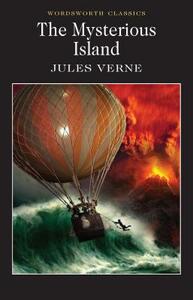You need to sign in or sign up before continuing.
Take a photo of a barcode or cover
My youngest son has been after me to read this for ages. It is actually his favorite Jules Verne, and he much prefers it to other "stranded on an island" novels like Robinson Crusoe and Swiss Family Robinson. So, it just happened to fit into categories on the two separate reading challenges I am doing this year, so why not? As it turned out, my son was right. I can see why he would have loved this when he was ten--I had fun too. Of course some things were silly, and the characters were always on the very verge of ruin and then "Ta-da"--a torpedo blows up the pirates. A saving ship arrives on the horizon. Et cetera. Also some of the descriptions of the animals on the island were hilarious. Not quite as hilarious as Swiss Family Robinson, which my kids persisted in treating as a comedy. LOL But . . . a bear, which is really a koala, which is actually a sloth . . . on an island in the southern Pacific . . . uh-huh. Donkey-like creatures. An orangutan. Whom they train to be a butler. Yeah. Oh, and they make explosives. Out of the dirt. Also there is an open vein of coal, just waiting for the coal to be picked up. Still, it was a lot of fun.
Verne is so verbose, this audiobook was 20 hours long.... I forgot how long winded he could be, I just remembered how much I enjoyed the 20,000 Leagues Under the Sea story. The first section was VERY technical, he took time to explain similar triangles.... The next section was a great survivalist story... The last section was a random inclusion of Captain Nemo to complete the trilogy. The middle section is what made me give this book 3 stars.
adventurous
informative
mysterious
slow-paced
Maybe this should be the book you take to a deserted island. It covers just about every specialty you need to survive, in surprising detail. The actual adventure is great too, with the mysterious presence on the island being quite the surprise. I read 20,000 leagues under the sea decades ago, but it is still one that pops into my head every now and then.
Recommend for people with reeeaallly long attention spans. And for those with interest in survival techniques ― kind of like those survival t.v. shows where the hosts and contestants receive everything they need and then are left to maybe or not kill themselves, depending on how smart they are.
This book is supposed to take place during the American Civil War. Don't ask how they ended up in the Pacific Ocean; it makes no sense.
Also, the ending is supposed to be a "surprise," featuring a cameo appearance by someone "famous."
First half of the book features a bunch of men back-slapping each other and wondering how long their clothing will stay in one piece.
Second half of the book: "Oh look, here are a ton of coincidental fortunate events and survival supplies. We won't starve or be naked or killed. Yay!"
Fun Fact! This book was the inspiration for the MYST computer game invented in the 1990s.

This book is supposed to take place during the American Civil War. Don't ask how they ended up in the Pacific Ocean; it makes no sense.
Also, the ending is supposed to be a "surprise," featuring a cameo appearance by someone "famous."
First half of the book features a bunch of men back-slapping each other and wondering how long their clothing will stay in one piece.
Second half of the book: "Oh look, here are a ton of coincidental fortunate events and survival supplies. We won't starve or be naked or killed. Yay!"
Fun Fact! This book was the inspiration for the MYST computer game invented in the 1990s.

This one took me a long time to read...there are parts that are quite dry and nearly nothing much happens because it's all described out in such minute detail. I could feel quite safe if I were a castaway and had only this book and a dog with me. Seriously, the details are so great that I could execute much of what they did...and it was amazing stuff they did. They sure knew their science. Anyway, there is also a grand amount of ingenuity, adventure and mystery, as well as real feeling in this story. Once I was caught up in their progress, and a great plight was then introduced, then I read faster. The mystery solved was fun and surprising. Then the last bits were fraught with suspense, loss and relief. I'll have to read some more Verne.
Apart from its enormous entertainment value, "The Mysterious Island" is notable for laying bare to the reader, in concise and lucid language, many of the industrial processes which transformed the world throughout the 19th century. Whether smelting ore, constructing mills, manufacturing batteries, or domesticating wildlife, the five (eventually six) castaways on Lincoln Island form themselves into a sort of living, breathing tableau from a museum of industrial history. Happily, none of this is at the expense of the story, which combines the science with elements of a classic castaway tale and a dose of mystery thrown in for good measure.
Although all of the characters are stylized and, therefore, stereotypical in many ways, the character of Neb deserves particular attention. All of the "colonists" of Lincoln Island are escaped prisoners of the U.S. Confederacy during the Civil War. This immediately tips us off to Verne's sympathies, and it is abundantly clear that he supported the Union, not neglecting the issue of abolition. Neb, thus, is a former slave who, upon being freed, has chosen to remain with Cyrus Harding, his "master." Consider that this is from a progressive-minded writer who clearly opposed slavery. Neb is never condescended to, his observations and conjectures are listened to with all seriousness, and on numerous occasions he proves himself in every way the equal of his peers. But the prejudices still creep in, despite the best intentions. Neb becomes the colony's un-official cook, taking over the kitchen, the implication being that it comes "most naturally" to him. He is also depicted as the most superstitious of the bunch, despite the fact that he can read and write (i.e., it can't merely be chalked up to lack of education). And, in the end, he dotes over Cyrus Harding to the negligence of his own welfare, indicating a blind, fanatical devotion. Evidently, deep-set racial prejudices are hard to shake, and it encourages present-day readers to reflect on the content of their own characters.
It is easy to level other criticism against "The Mysterious Island" as well. Lincoln Island is presented as a near-perfect microcosm of the Earth. Very few resources are lacking, and for those that are, reasonable substitutes always seem to be at hand. The island provides them with water, food, and dubiously convenient natural shelter. The suspension of disbelief is challenged on numerous other counts. For example, the castaways happen to have brought an intelligent and faithful dog with them, who proves invaluable with regard to both hunting and security. Similarly, through a series of unlikely events, the castaways are able to domesticate a wild orangutan, training him to serve as a sort of valet. Even the presence of Cyrus Harding (not "Smith" in this edition) is remarkable, as the depth and breadth of his technical knowledge apparently know no bounds. Harding is the equivalent of a 19th century Renaissance man, despite the fact that, by the time this book was written, it was practically impossible to obtain such mastery over so many specialized areas of knowledge. And, as Isaac Asimov notes in his afterword, the colonists never rub each other the wrong way (let alone fight), and the subject of women is never mentioned.
Interestingly enough, none of these criticism mar the novel much, even to a contemporary reader. Verne so effectively intertwines science, adventure, mystery, social commentary, and character development, that the flaws just cited are only regarded as afterthoughts. The reader is swept up. As regards the mystery, Verne allows it to percolate very slowly and, in the end, it provides closure to a story arc which he had initiated many years earlier. Elements of the ending may come off as predictable, even trite, from our perspective, but it's always best to consider how readers in 1874 might have responded.
Exciting, provocative, and worthy of the mystery in its title. One of the best Verne novels I've read.
Although all of the characters are stylized and, therefore, stereotypical in many ways, the character of Neb deserves particular attention. All of the "colonists" of Lincoln Island are escaped prisoners of the U.S. Confederacy during the Civil War. This immediately tips us off to Verne's sympathies, and it is abundantly clear that he supported the Union, not neglecting the issue of abolition. Neb, thus, is a former slave who, upon being freed, has chosen to remain with Cyrus Harding, his "master." Consider that this is from a progressive-minded writer who clearly opposed slavery. Neb is never condescended to, his observations and conjectures are listened to with all seriousness, and on numerous occasions he proves himself in every way the equal of his peers. But the prejudices still creep in, despite the best intentions. Neb becomes the colony's un-official cook, taking over the kitchen, the implication being that it comes "most naturally" to him. He is also depicted as the most superstitious of the bunch, despite the fact that he can read and write (i.e., it can't merely be chalked up to lack of education). And, in the end, he dotes over Cyrus Harding to the negligence of his own welfare, indicating a blind, fanatical devotion. Evidently, deep-set racial prejudices are hard to shake, and it encourages present-day readers to reflect on the content of their own characters.
It is easy to level other criticism against "The Mysterious Island" as well. Lincoln Island is presented as a near-perfect microcosm of the Earth. Very few resources are lacking, and for those that are, reasonable substitutes always seem to be at hand. The island provides them with water, food, and dubiously convenient natural shelter. The suspension of disbelief is challenged on numerous other counts. For example, the castaways happen to have brought an intelligent and faithful dog with them, who proves invaluable with regard to both hunting and security. Similarly, through a series of unlikely events, the castaways are able to domesticate a wild orangutan, training him to serve as a sort of valet. Even the presence of Cyrus Harding (not "Smith" in this edition) is remarkable, as the depth and breadth of his technical knowledge apparently know no bounds. Harding is the equivalent of a 19th century Renaissance man, despite the fact that, by the time this book was written, it was practically impossible to obtain such mastery over so many specialized areas of knowledge. And, as Isaac Asimov notes in his afterword, the colonists never rub each other the wrong way (let alone fight), and the subject of women is never mentioned.
Interestingly enough, none of these criticism mar the novel much, even to a contemporary reader. Verne so effectively intertwines science, adventure, mystery, social commentary, and character development, that the flaws just cited are only regarded as afterthoughts. The reader is swept up. As regards the mystery, Verne allows it to percolate very slowly and, in the end, it provides closure to a story arc which he had initiated many years earlier. Elements of the ending may come off as predictable, even trite, from our perspective, but it's always best to consider how readers in 1874 might have responded.
Exciting, provocative, and worthy of the mystery in its title. One of the best Verne novels I've read.
I enjoyed this more than I anticipated. It was selected by someone else in my book club, so it wasn't something I would have chosen on my own. It really was an enjoyable adventure with endearing characters, and delightful descriptions of an island on which I might not mind being cast away. The description of the feats managed by the colonists were pretty fascinating. Certainly, it all seemed a bit far-fetched, but it reminded me how self-reliant men and women had to be in those days - so maybe not terribly far-fetched.
adventurous
challenging
hopeful
informative
mysterious
slow-paced
Plot or Character Driven:
Plot
Strong character development:
No
Loveable characters:
No
Diverse cast of characters:
Complicated
Flaws of characters a main focus:
No
This book is slow paced, and I mean VERY slow. Certainly one of Verne's more sluggish books (especially due to the length). However, read in short bursts, it makes for a neat story that if you like castaway tales of adventurers figuring out "modern" technology on their own you'll enjoy. I was quite shocked at the connection to another Verne tale, which I won't divulge here, but I certainly was surprised! Overall, I wouldn't undertake reading this book again, but still found value in having read it.
Moderate: Racial slurs, Racism
3.5 Stars
I understand the love, but really this is Verne’s most formulaic novel, taking after Robinson Crusoe and it’s ilk, like Swiss Family Robinson. The biggest boosts here are the references to Overall, it’s good, but much of the most interesting stuff comes in the second half after Verne gets lost in his details, as usual.
Jules Verne Ranked
1. Twenty Thousand Leagues under the Seas (1869–70) [VE #6] 5 Stars
2. The Adventures of Captain Hatteras (1866) [VE #2] 4 Stars
3. Around the World in 80 Days (1872) [VE #11] 4 Stars
4. From the Earth to the Moon (1865) [VE #4] 3.5 Stars
5. The Mysterious Island (1873) [VE #10] 3.5 Stars
6. The Fur Country (1873) [VE #10] 3 Stars
7. Journey to the Center of the Earth (1864, revised 1867) [VE #3] 3 Stars
8. In Search of the Castaways (1867–68) [VE #5] 2.5 Stars
9. Five Weeks in a Balloon (1863) [VE #1] 2.5 Stars
10.A Floating City (1871) [VE #8] 2 Stars
11. Round the Moon (1870) [VE #7] 2 Stars
12. Three Englishmen and Three Russians in South Africa (1872) [VE #9] 1 Star
I understand the love, but really this is Verne’s most formulaic novel, taking after Robinson Crusoe and it’s ilk, like Swiss Family Robinson. The biggest boosts here are the references to
Spoiler
In Search of the Castaways and and especially Twenty Thousand Leagues under the Seas. I do think that Nemo gets a little flattened, losing some of his revolutionary fervor, but his epitaph is pretty decent.Jules Verne Ranked
1. Twenty Thousand Leagues under the Seas (1869–70) [VE #6] 5 Stars
2. The Adventures of Captain Hatteras (1866) [VE #2] 4 Stars
3. Around the World in 80 Days (1872) [VE #11] 4 Stars
4. From the Earth to the Moon (1865) [VE #4] 3.5 Stars
5. The Mysterious Island (1873) [VE #10] 3.5 Stars
6. The Fur Country (1873) [VE #10] 3 Stars
7. Journey to the Center of the Earth (1864, revised 1867) [VE #3] 3 Stars
8. In Search of the Castaways (1867–68) [VE #5] 2.5 Stars
9. Five Weeks in a Balloon (1863) [VE #1] 2.5 Stars
10.A Floating City (1871) [VE #8] 2 Stars
11. Round the Moon (1870) [VE #7] 2 Stars
12. Three Englishmen and Three Russians in South Africa (1872) [VE #9] 1 Star



